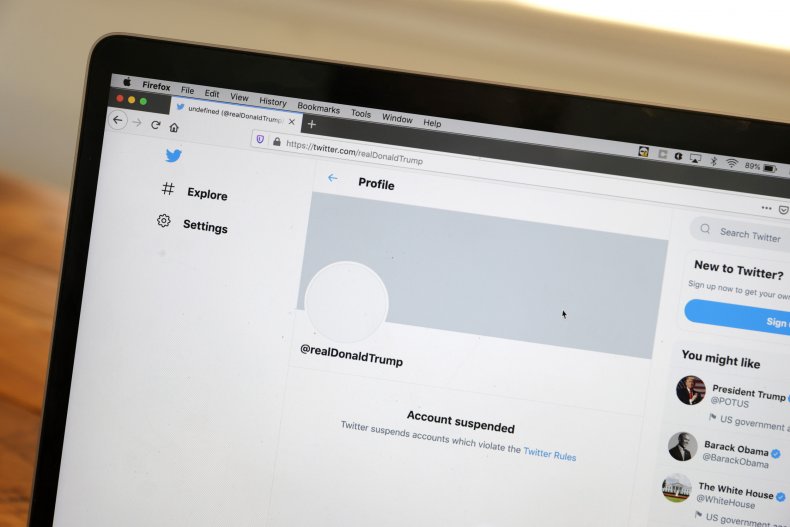[ad_1]
While world leaders largely condemned the ugly scenes of chaos and insurrection in Washington, D.C. last week, some have spoken out against the decision of major social media companies to ban President Donald Trump from their platforms for fear of him inciting more unrest before President-elect Joe Biden’s inauguration.
Leaders and senior government officials across the world have expressed concern at the decision to remove Trump’s pages from Twitter, Facebook and Instagram—among others—after he incited the violence at the Capitol last week. Several suggested the move set a worrying precedent for freedom of expression online, regardless of Trump’s inflammatory behavior.
German Chancellor Angela Merkel is the highest profile leader to have expressed concern, perhaps surprisingly given her testy relationship with Trump and the gulf in their political style and world outlook.
Merkel spokesperson Steffen Seibert described the ban as “problematic” on Monday, Politico reported. “The fundamental right [of freedom of expression] can be interfered with, but along the lines of the law and within the framework defined by the lawmakers,” Seibert said. “Not according to the decision of the management of social media platforms.”
Seibert added that the German government remains “convinced that social network operators bear a very high level of responsibility…for ensuring that political communication is not poisoned by hatred, by lies, by incitement to violence.”
Elsewhere in Europe, French Finance Minister Bruno Le Maire said Monday to France Inter: “What shocks me is that Twitter is the one to close his account. The regulation of the digital world cannot be done by the digital oligarchy.” Le Maire did, however, add his condemnation of Trump’s “lies.”
Cédric O, a junior minister in France’s Ministry for Digital Affairs, said on Twitter: “The regulation of public discourse by the main social media companies with regards only to their Terms and Conditions … seems, to say the least, a little short from a democratic point of view.”
Within the European Union too, there was disquiet over the actions of the social media giants. EU foreign affairs chief Josep Borrell published a blog post warning the bloc must “be able to better regulate the contents of social networks, while scrupulously respecting freedom of expression.”
“It is not possible for this regulation to be carried out mainly according to rules and procedures set by private actors,” Borrell added.
Manfred Weber, the leader of the European People’s Party—the largest in the European Parliament—told Politico: “The EU mustn’t let Facebook and Twitter decide what’s within the boundaries of the acceptable on their platforms.
“We cannot leave it to American Big Tech companies to decide how we do and do not discuss, what can and cannot be said in a democratic discourse. We need a stricter regulatory approach.”
In Mexico, leftist populist Andrés Manuel López Obrador—known as AMLO—condemned the move, which he described as a “bad omen.” He explained to Bloomberg: “It’s like a censorship court is being created, like the Holy Inquisition, for the management of public opinion.”
Further south in Brazil, one of the sons of far-right populist President Jair Bolsonaro changed his Twitter profile picture to a photograph of Trump to express his support for the outgoing president. The Bolsonaros have often been compared to Trump and his family, and members of both have faced accusations of criminality, corruption and incitement to violence.
Eduardo Bolsonaro said the ban was “authoritarian” and tweeted: “A world where Maduro is on social media, but Trump is suspended cannot be normal.”
Another controversial leader, Chechnya’s Ramzan Kadyrov said on Telegram that he and Trump now had something in common, according to The Financial Times.
“Now I have something in common with Donald Trump: whereas previously he blocked my accounts on social networks, now the Almighty God has restored justice, and, as a result, the accounts of the mutinous Donald Trump were also blocked,” Kadyrov wrote.
Alexey Navalny—a prominent pro-democracy campaigner in Russia who recently survived a poisoning attempt by Russia’s FSB intelligence service—also criticized the social media giants. In a thread, he described the Trump ban as “an unacceptable act of censorship” that was “based on emotions and personal political preferences.”
Navalny warned that the move could be used as a precedent for further crackdowns on others and which could be “exploited by the enemies of freedom of speech around the world.”
Navalny added his own criticism of Trump’s actions, writing: “Of course, during his time in the office, Trump has been writing and saying very irresponsible things. And paid for it by not getting re-elected for a second term.”

Justin Sullivan/Getty Images/Getty
[ad_2]
Source link